
Final Thoughts
Could an upcoming BRICS meeting spell trouble for President Trump's trade policy?

Could an upcoming BRICS meeting spell trouble for President Trump's trade policy?

SMU’s hot-rolled (HR) coil price held steady this week while prices for other sheet and plate products declined.
Steel executives packed the main conference hall of the 2025 SMU Steel Summit on Tuesday, Aug. 26, to hear economist Dr. Anirban Basu lay out his blunt view of tariffs, inflation, and demand.

Another record-breaking SMU Steel Summit is in the books. Thanks to all of you – attendees, speakers, sponsors, and exhibitors – for making it possible it in what has been an uncertain year for steel.
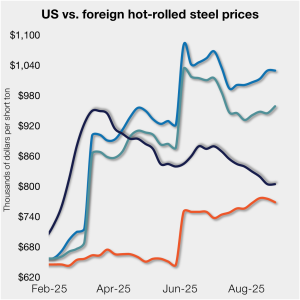
Domestic hot-rolled (HR) coil prices were flat this week, while offshore prices varied week over week (w/w). The price margin between stateside and foreign product was little changed as a result.
Steel prices, end-use demand, inventory levels, tariffs, imports, and evolving market events... what is the steel industry talking about this week?
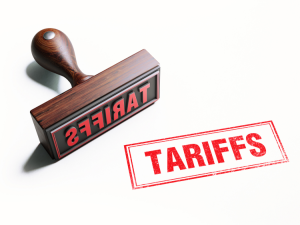
Canada has agreed to drop some retaliatory tariffs on US products, effective Sept. 1.

The big show is here again. SMU Steel Summit begins on Monday. This year, like last year, more than 1,500 people will be joining us. And I couldn’t be more excited to have everyone here in Atlanta.

As everyone surely knows by now, the SMU Steel Summit starts on Monday in Atlanta, Ga. So, this is a great opportunity to reflect on how much has changed since the 2024 Summit. Certainly, no one could have imagined the wholesale and transformative changes to U.S. and global trade policy.

With SMU Steel Summit starting in just a few days, I decided to go back and do a quick check on where things stand now compared to the week before Summit last year.
Australia-based global recycler Sims Ltd. has a rosy long-term outlook, while the company said tariffs are supporting US demand for ferrous scrap.
China has requested dispute consultations with Canada at the WTO about Canadian measures on Chinese steel and aluminum imports.

Is a pattern finally emerging in the post-Liberation Day tariff landscape?

The Commerce Department has added over 400 HTS codes to the list of steel and aluminum derivative products covered under the Section 232 tariffs.

The question of the new world order was on many minds last week when I spoke on another SMU Community Chat. The short answer is that nobody knows in detail what the effects of all the economic and geopolitical developments will be.
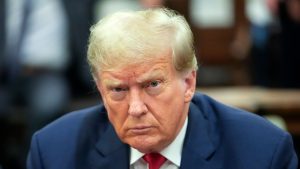
While boarding Airforce One on Friday, US President Donald Trump stated that he would be setting more steel tariffs and putting ~100% tariffs on semiconductors and chips.
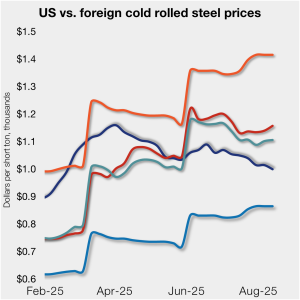
Cold-rolled (CR) coil prices continued to decline in the US this week, while prices in offshore markets diverged and ticked higher.

Reporting and enforcing steel tariffs are two top–of-mind concerns for US manufacturers, the US Customs and Border Protection agency, importers, and others across the supply chain.

A tour of the economy as it relates to hot-rolled coil futures.
On Monday and Tuesday of this week, SMU polled steel buyers on an array of topics, ranging from market prices, demand, and inventories to tariffs, imports, and evolving market events.
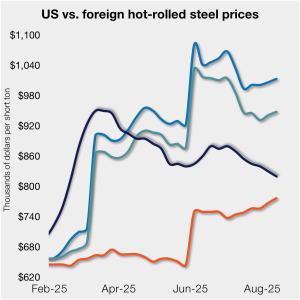
Hot-rolled (HR) coil prices in the US declined again last week, while offshore prices ticked higher again week over week (w/w).
US President Donald Trump extended the US and China’s 90-day pause on planned reciprocal tariffs on Monday.

The administration continues to negotiate deals with US trading partners, and the reciprocal tariff program appears poised for further modification. This week, we focus on other important developments that may have received less media attention.
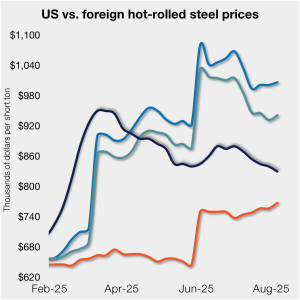
Hot-rolled (HR) coil prices in the US declined again last week, while offshore prices increased week over week (w/w).

Veteran trade attorney Lewis Leibowitz will join SMU for a Community Chat on Wednesday, Aug. 13, at 11 am ET.

The tariffs amount to a wholesale transformation of US trade policy from one promoting increasing international interaction to one of restricting trade to serve national strategic goals.
Olympic Steel's earnings fell in the second quarter amid an "unprecedented" environment in the metals industry.
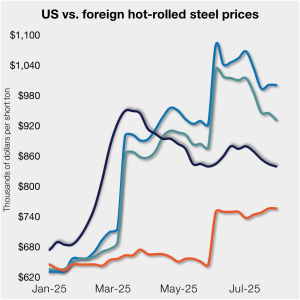
Hot-rolled (HR) coil prices in the US edged lower again this week, while offshore price were little changed. Stateside prices continue to trail imports from Europe, supported by Section 232 steel tariffs.
Earlier this week, SMU polled steel buyers on an array of topics, ranging from market prices, demand, and inventories to tariffs, imports, and evolving market events.
ArcelorMittal expects less demand growth across most of the markets it operates in, including the US, because of President Donald Trump’s tariffs. But the Luxembourg-based steelmaker also thinks it stands to benefit from an increasingly regionalized world thanks to investments like the new EAF at its mill in Calvert, Ala.